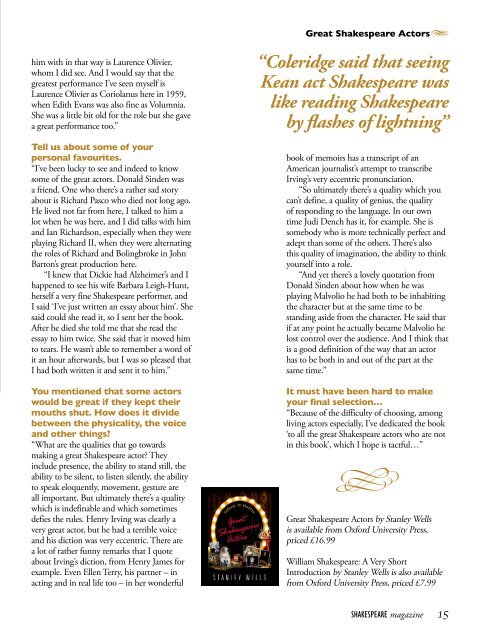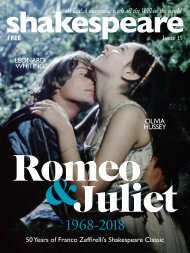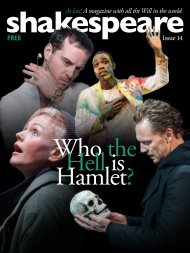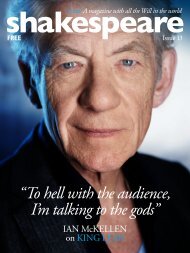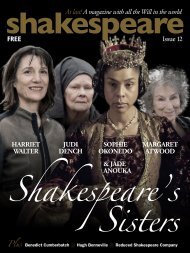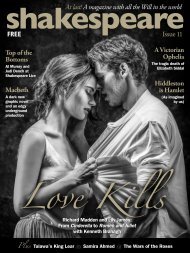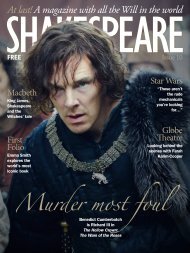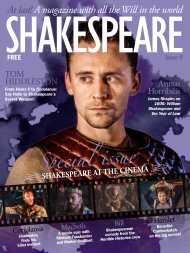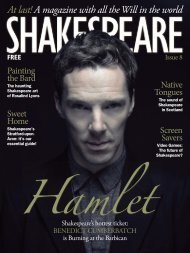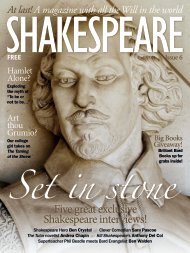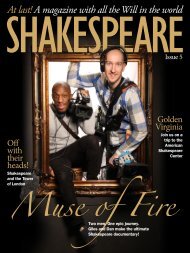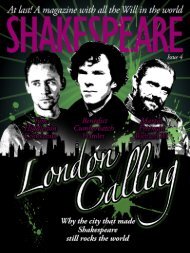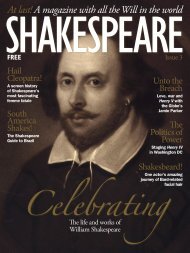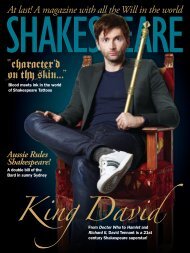Shakespeare Magazine 07
Kenneth Branagh is cover star of Shakespeare Magazine 07, as the issue's theme is Great Shakespeare Actors. Stanley Wells discusses his book on the subject, while Antony Sher reveals what it's like to play Falstaff. We also go behind the scenes of the My Shakespeare TV series, and Zoe Waites chats about playing Rosalind in the USA. Other highlights include Shakespeare in Turkey, Shakespeare Opera, and the real story of Shakespeare and the Essex Plot. All this, and the Russian fans who made their own edition of David Tennant's Richard II!
Kenneth Branagh is cover star of Shakespeare Magazine 07, as the issue's theme is Great Shakespeare Actors. Stanley Wells discusses his book on the subject, while Antony Sher reveals what it's like to play Falstaff. We also go behind the scenes of the My Shakespeare TV series, and Zoe Waites chats about playing Rosalind in the USA. Other highlights include Shakespeare in Turkey, Shakespeare Opera, and the real story of Shakespeare and the Essex Plot. All this, and the Russian fans who made their own edition of David Tennant's Richard II!
Create successful ePaper yourself
Turn your PDF publications into a flip-book with our unique Google optimized e-Paper software.
Great <strong>Shakespeare</strong> Actors <br />
him with in that way is Laurence Olivier,<br />
whom I did see. And I would say that the<br />
greatest performance I’ve seen myself is<br />
Laurence Olivier as Coriolanus here in 1959,<br />
when Edith Evans was also fine as Volumnia.<br />
She was a little bit old for the role but she gave<br />
a great performance too.”<br />
Tell us about some of your<br />
personal favourites.<br />
“I’ve been lucky to see and indeed to know<br />
some of the great actors. Donald Sinden was<br />
a friend. One who there’s a rather sad story<br />
about is Richard Pasco who died not long ago.<br />
He lived not far from here, I talked to him a<br />
lot when he was here, and I did talks with him<br />
and Ian Richardson, especially when they were<br />
playing Richard II, when they were alternating<br />
the roles of Richard and Bolingbroke in John<br />
Barton’s great production here.<br />
“I knew that Dickie had Alzheimer’s and I<br />
happened to see his wife Barbara Leigh-Hunt,<br />
herself a very fine <strong>Shakespeare</strong> performer, and<br />
I said ‘I’ve just written an essay about him’. She<br />
said could she read it, so I sent her the book.<br />
After he died she told me that she read the<br />
essay to him twice. She said that it moved him<br />
to tears. He wasn’t able to remember a word of<br />
it an hour afterwards, but I was so pleased that<br />
I had both written it and sent it to him.”<br />
You mentioned that some actors<br />
would be great if they kept their<br />
mouths shut. How does it divide<br />
between the physicality, the voice<br />
and other things?<br />
“What are the qualities that go towards<br />
making a great <strong>Shakespeare</strong> actor? They<br />
include presence, the ability to stand still, the<br />
ability to be silent, to listen silently, the ability<br />
to speak eloquently, movement, gesture are<br />
all important. But ultimately there’s a quality<br />
which is indefinable and which sometimes<br />
defies the rules. Henry Irving was clearly a<br />
very great actor, but he had a terrible voice<br />
and his diction was very eccentric. There are<br />
a lot of rather funny remarks that I quote<br />
about Irving’s diction, from Henry James for<br />
example. Even Ellen Terry, his partner – in<br />
acting and in real life too – in her wonderful<br />
“Coleridge said that seeing<br />
Kean act <strong>Shakespeare</strong> was<br />
like reading <strong>Shakespeare</strong><br />
by flashes of lightning”<br />
book of memoirs has a transcript of an<br />
American journalist’s attempt to transcribe<br />
Irving’s very eccentric pronunciation.<br />
“So ultimately there’s a quality which you<br />
can’t define, a quality of genius, the quality<br />
of responding to the language. In our own<br />
time Judi Dench has it, for example. She is<br />
somebody who is more technically perfect and<br />
adept than some of the others. There’s also<br />
this quality of imagination, the ability to think<br />
yourself into a role.<br />
“And yet there’s a lovely quotation from<br />
Donald Sinden about how when he was<br />
playing Malvolio he had both to be inhabiting<br />
the character but at the same time to be<br />
standing aside from the character. He said that<br />
if at any point he actually became Malvolio he<br />
lost control over the audience. And I think that<br />
is a good definition of the way that an actor<br />
has to be both in and out of the part at the<br />
same time.”<br />
It must have been hard to make<br />
your final selection…<br />
“Because of the difficulty of choosing, among<br />
living actors especially, I’ve dedicated the book<br />
‘to all the great <strong>Shakespeare</strong> actors who are not<br />
in this book’, which I hope is tactful…”<br />
<br />
Great <strong>Shakespeare</strong> Actors by Stanley Wells<br />
is available from Oxford University Press,<br />
priced £16.99<br />
William <strong>Shakespeare</strong>: A Very Short<br />
Introduction by Stanley Wells is also available<br />
from Oxford University Press, priced £7.99<br />
SHAKESPEARE magazine 15


